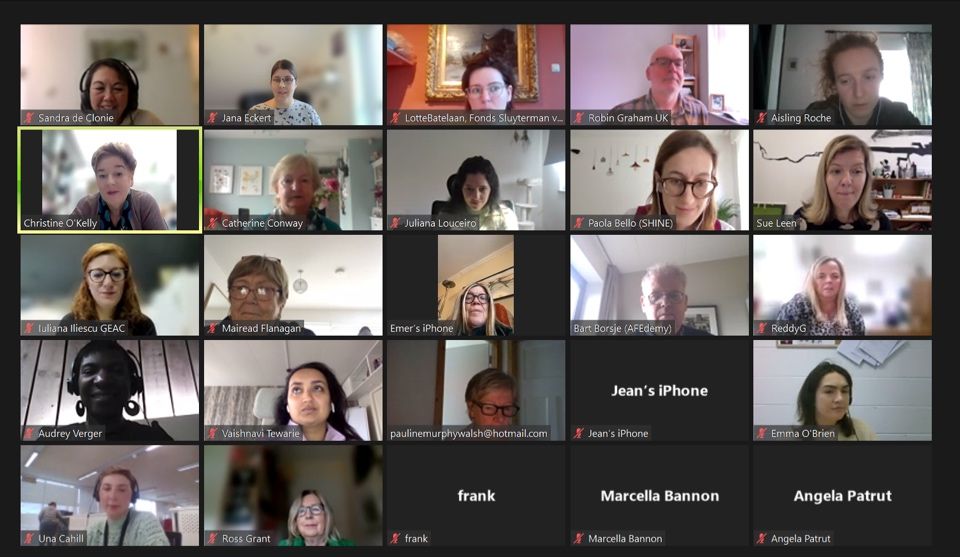It was an honour to share our work at Dublin City University (DCU) on the virtual Cycle of Exchange on Tuesday, December 4th, as part of the COPE project. DCU welcomed over 28 participants to the virtual session, which included artists, healthcare professionals, stakeholders, and project partners. It is one of five sessions delivered by partners, and the theme of this session, “Uncover your local area through art”, examined the culture programme offered by DCU called “Building Stories”. The presentation also shared the current social prescribing landscape in Ireland, DCU’s response to the project, and input from Dr Tara Byrne, Age and Opportunity, Catherine Conway, a COPE participant and Susan Leen, artist in residence at DCU.
Christine O’Kelly, Age-Friendly (AFU) Co-ordinator at DCU, provided a broad overview of the implementation of social prescribing in Ireland and how the Culture on Prescription Project harnessed cultural opportunities to deliver a form of social prescribing to engage participants. Narrative responses from participants reported an increased sense of well-being, something to look forward to, making new friends, and developing new skills. DCU also produced a compendium of best practices for municipalities showcasing best practices from partner countries on social prescribing.
Age and Opportunity is a national organisation leading key sports and culture programmes to support positive and active ageing. They have developed resources to deliver sports programmes, arts in care settings, a toolkit for artists in residence, support programmes, and the artists’ care exchange. Guest presenter Dr Tara Byrne, Arts Programme Manager, Age and Opportunity and artistic director of the Bealtaine Festival, presented several initiatives that Age and Opportunity (A&O) developed. These resources are free and available to download.
DCU’s artist-in-residence Susan Leen, arts facilitator in the COPE project, shared her knowledge and experience delivering the “Building Stories” workshop, the cultural activity offered by DCU as part of COPE. “Building Stories” allowed participants to learn various printing techniques about places of particular and personal significance. We learned how the activity helped participants articulate and share their emotional stories. We also learned about the importance of considering the location and place of the workshop, its ambience and facilities offered, and its location and accessibility. In addition, the practical use of tools and materials to participate in the workshop was a consideration. Susan also reiterated the need to know how to support participants who often shared emotional and life-changing experiences by having information on how to direct them to appropriate services. Other workshop benefits reiterated evidence from other partners in previous cycles, including making new friends, having a sense of purpose, learning new skills, and recognising their achievements with a certificate of participation. Workshop participant Catherine Conway confirmed this by saying, “I highly recommend trying your hand at printing, which helped me produce some lovely work and for the social aspect. It is a worthwhile project, and I have made some new friends!!
From a national, cultural and social perspective, we are all experiencing ageing differently. Even though social prescribing and cultural activities are well developed in Ireland as both policy and practice, we have learned a lot from our European partners. Working with partners on this important project, which is so impactful, has been a great honour. The virtual cycle of exchange is a wonderful platform to share information, and all of the partners and participants have provided insightful information and evidence that using cultural prescribing inspires the possibility of future developments in this area to combat loneliness, isolation and mental illness, which have become so prevalent in our societies since COVID.

